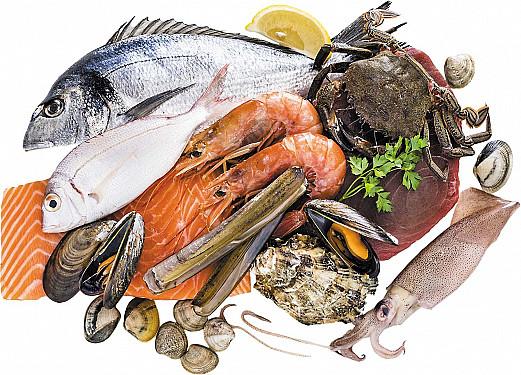Seafood: A Fresh and Flavorful Source of Protein

Seafood is a broad category of food that includes fish, shellfish, and crustaceans. It's celebrated for its delicate flavors, variety, and the numerous health benefits it offers. Seafood is rich in high-quality protein, omega-3 fatty acids, and essential vitamins and minerals.
1. Fish
Fish is one of the most popular
types of seafood, with many varieties available, ranging from mild to rich in
flavor. Some of the most common types of fish include:
- Salmon:
Known for its rich, fatty texture and health benefits, salmon is packed
with omega-3 fatty acids. It can be grilled, baked, smoked, or served raw
in sushi. The versatility of salmon makes it a favorite in many dishes.
- Tuna:
Often used in sushi, salads, or grilled steaks, tuna is a meaty fish with
a mild flavor. Its high protein content and healthy fats make it a
nutritious option.
- Cod:
With a light, flaky texture, cod is a mild-flavored white fish that’s
often used in fish and chips, as well as soups and chowders. It’s great
for baking, broiling, or pan-frying.
- Trout:
A delicate, sweet fish that is often grilled, pan-seared, or smoked, trout
is another popular choice for seafood lovers.
2. Shellfish
Shellfish refers to creatures with
exoskeletons, such as mollusks and crustaceans. These include some of the most
prized seafood items around the world.
- Shrimp:
Known for its delicate sweetness and firm texture, shrimp is a versatile
ingredient used in everything from shrimp scampi to sushi and stir-fries.
- Lobster:
With its tender meat and rich, buttery flavor, lobster is often considered
a luxury seafood item. It's usually boiled or steamed and served with
melted butter.
- Crab:
Crab meat is sweet and succulent, with varieties like blue crab, king
crab, and snow crab offering different textures and flavors. Crab cakes,
crab legs, and crab chowder are just a few of the many ways to enjoy it.
- Oysters:
Often eaten raw on the half shell, oysters are prized for their briny,
fresh flavor. They can also be grilled, baked, or served in seafood stews.
3. Mollusks
Mollusks include creatures like
clams, mussels, and scallops, which are prized for their delicate textures and
subtle flavors.
- Clams:
These bivalve mollusks have a slightly salty flavor and are often used in
clam chowder, pasta dishes, or simply steamed with butter.
- Mussels:
Mussels have a tender texture and a briny taste. They’re commonly steamed
in a flavorful broth with garlic, wine, and herbs.
- Scallops:
Known for their sweet, delicate flavor and firm texture, scallops are
often seared to create a delicious caramelized crust while maintaining
their tender interior.
Health Benefits of Meat and Seafood
Both meat and seafood provide
high-quality protein, which is essential for building and repairing tissues,
producing enzymes and hormones, and supporting immune function. Additionally,
seafood, in particular, is rich in omega-3 fatty acids, which are beneficial
for heart health and brain function. Some other health benefits include:
- Iron:
Red meats like beef and lamb are excellent sources of heme iron, which is
crucial for oxygen transport and overall energy levels.
- Vitamins:
Meat and seafood are also rich in essential vitamins, including B vitamins
(especially B12), which are vital for energy metabolism and red blood cell
formation.
- Omega-3 Fatty Acids:
Found in fatty fish like salmon and tuna, omega-3s support cardiovascular
health, reduce inflammation, and enhance brain function.
Post Your Ad Here


Comments